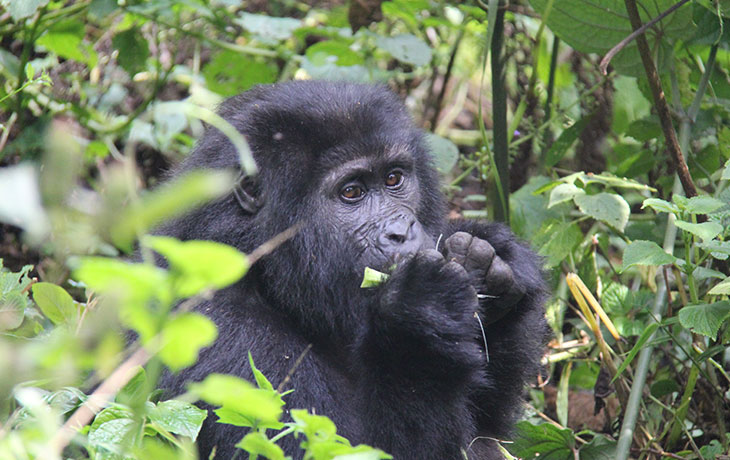It is very important to share with you our safety tips or guidelines on gorilla trekking rules and other wildlife travel tips while in Uganda. These guidelines are issued and clearly observed by Uganda Wildlife Authority, and they include.

- Anyone with flu or a cold is not permitted to trek, and it is advisable that you talk to your guide if you are likely to have any symptoms.
- Bring your passport for check.
- Your group will be led by a head ranger and an assistant allocated to your group at the headquarters.
- The warden generally knows how far the gorilla groups are from the park. They will be spread over different mountains so you will have to drive to the base to start the trek.
- You will also receive a wooden walking stick for which you do not need to pay but you may buy it at the end of the trek as a memento or return it to the ranger.
- We want you to enjoy this trek so do not rush and do take a rest while climbing as the slopes are steep and the altitude will make you tired. When you do find the gorillas you will have an hour to observe them. The head guide will instruct you on what to do and where to go while you observe the gorillas. Please listen to him/her as he/she is very experienced.
- Your trek should be over by lunch time if the gorillas are not too far. At the finish, you will receive a certificate and will perhaps want to tip the guides and porters (tipping guidelines are provided).
- To minimize possible transmission of human diseases, visitors are asked to maintain a distance of 7m (about 22 feet) from the gorillas. If you are sick with a cold, flu or other contagious illness, please do not visit the gorillas.
- Viewing time is limited to one hour.
- Maximum 8 visitors per group.
- Spitting in the park is strictly prohibited.
- Should you need to cough, cover your mouth and turn away from the gorillas.
- When with the gorillas, keep your voice low.
- Try not to make rapid movements that may frighten the gorillas.
- If a gorilla should charge or vocalize at you, do not be alarmed, stand still, look away from the gorilla and follow your guide’s directions.
- Do not litter.
- Do not use flash photography.
Safety is of utmost concern to us, and we request you take note of the following guidelines to be observed at your Gorilla trekking rules.
- The wild animals are not like those found in theme parks – they aren’t tame.
- Most of the safari camps are unfenced and dangerous animals can (and do!) wander through the camps. Many of the animals and reptiles you will see are potentially dangerous. Attacks by wild animals are rare but there are no guarantees that such incidents will not occur. Tourcan Vacations, their staff members, associates, agents, or their suppliers cannot be held liable for any injuries caused during an incident involving the behavior of wild animals.
- Please listen to the camp staff and guides. The safety precautions need to be taken seriously, and strictly adhered to.
- Never walk on your own without a guide – even to your rooms. After retiring to your rooms at night, don’t leave them.
- Observe animals silently and with a minimum of disturbance to their natural activities. Loud talking on game drives can frighten the animals away.
- Never attempt to attract an animal’s attention. Don’t imitate animal sounds, clap your hands, pound the vehicle or throw objects.
- Please respect your driver-guide’s judgment about proximity to lions, cheetahs and leopards. Don’t insist that he take the vehicle closer so you can get a better photograph. A vehicle driven too close can hinder a hunt or cause animals to abandon a hard-earned meal.
- Litter tossed on the ground can choke or poison animals and birds and is also unsightly plus environmentally-unfriendly.
- Never attempt to feed or approach any wild animal on foot. This is especially important near lodges or in campsites where animals may have become accustomed to human visitors.
- Refrain from smoking on game drives. The dry African bush ignites very easily, and a flash fire can kill animals.
